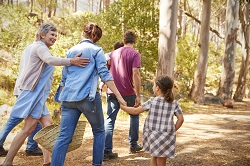Coping tips for Sandwich Generation caregivers
by Sheila Despres

During the COVID-19 pandemic, some people were unexpectedly thrust into a “sandwich generation” caregiver role—caring for their kids as well as older loved ones. Others were sandwich generation caregivers all along and were accustomed to hectic schedules and overcoming obstacles.
No matter the situation, basic guidelines of caregiving can help you navigate this challenging and meaningful role.
Consider the following tips to help you effectively manage caregiving for older and younger loved ones, while maintaining your own physical and mental well-being.
1. Adopt a team-based mentality
As a caregiver, you may be used to providing care to your loved ones without much help. Sometimes, though, everyone needs help.
Make a list of caregiving tasks you need help with. For instance, other people in your household may be able to tackle responsibilities such as housekeeping, grocery shopping or picking up medication from the pharmacy.
Can anyone at home watch the kids for a couple hours? Could you arrange for a friend or relative outside your home to video chat with your loved ones?
Consider ways for others to help in a temporary caregiver role.
2. Talk to your employer
If you have work responsibilities, schedule time with your manager or someone from human resources to talk about your situation. There may be resources available to help better balance your work and personal life. Talk to your Human Resources Department to see if an employee assistance program (EAP) is in place.
Discuss arrangements that can help you get your job done, while being accessible to your loved ones.
Don’t assume your workplace will not help. Now may be the best time to adjust your schedule so that it is flexible enough for everyone.
3. Remote services can ease the burden
The COVID-19 pandemic required remote services and the technology to help use them. Lean on that technology and those services when you can.
In some cases, social workers, in-home aides and other health professionals may be able to mobilize help. Call your loved one’s doctor to see what your options are. You may be able to receive instructions on how to help older loved ones with certain activities of daily living they may struggle to do themselves.
Many health care providers are still offering their services via telehealth, which can be a good way to ensure your loved ones get the care they need—before small health issues become larger problems. However, it’s important that your loved ones are seen for all urgent medical issues right away. If telehealth won’t address an urgent situation, take action to have your loved one get in-person care.
Your loved one’s pharmacy may be able to deliver prescriptions as well. And check with their health plan to see if mail order prescriptions are available.
Delivery options may also be available when it comes to food. You can order groceries online through services such as Peapod, Instacart and Amazon Prime Whole Foods Market. Take out delivery is often available through Grubhub or DoorDash.
4. Play together
Technology is a great resource to use when you can't be together in person.
Video chatting is one way many stayed in touch with each other during the pandemic. Finding games that your older and younger loved ones can play together is an added bonus. If your older loved ones are living elsewhere, consider games or activities that your loved ones can do together, but virtually:
- Charades can be played by simply having each “team” Google the search term “charade topics”
- Consider an “Art of the Day” activity where everyone can draw, paint or sculpt creations that can be shared with each other later that day
- If you use a video chat service that enables screen sharing of YouTube, consider searching songs in order to have a little karaoke fun
5. Take time to tend to yourself
In the best of times, healthy habits are crucial for caregivers. A time of crisis, such as the COVID-19 pandemic, only amplifies that need for self-care.
If someone in your household can share responsibilities, consider setting up a calendar that has time built in to allow you adequate time to step away, shower, go for a walk and/or decompress.
A caregiver who is sick, overworked or burned out makes everyone’s situation that much more difficult.
Sheila Despres is Site Director for the Leominster, Massachusetts, location of Fallon Health’s Program of All-Inclusive Care for the Elderly (PACE) – Summit ElderCare, which provides medical care, insurance coverage, home assistance, adult day health services and social support to adults age 55+ so that they can remain living in their homes.
Posted: June 2020
Updated: May 2023